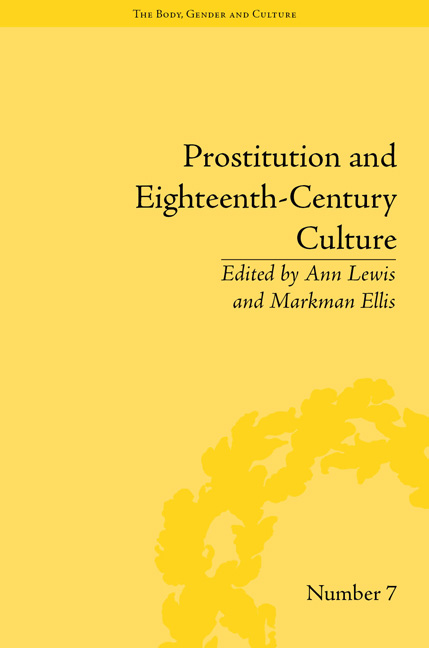Book contents
- Frontmatter
- CONTENTS
- Acknowledgements
- List of Contributors
- List of Figures and Tables
- Introduction: Venal Bodies – Prostitutes and Eighteenth-Century Culture
- Part I (Auto)Biographical and Classificatory Fictions: Madams, Courtesans, Whores
- 1 Classifying the Prostitute in Eighteenth-Century France
- 2 In Her Own Words: An Eighteenth-Century Madam Tells Her Story
- 3 ‘All the World Knows Her Storie’: Aphra Behn and the Duchess of Mazarin
- 4 Marie Petit's Persian Adventure (1705–8): The Eastward Travels of a French ‘Concubine’
- 5 ‘A First-Rate Whore’: Prostitution and Empowerment in the Early Eighteenth Century
- Part II Visibility and Theatricality: Fiction, Image and Performance
- Part III The Magdalen House: Marriage, Motherhood, Social Reintegration
- Part IV Wider Perspectives: Constructing the Prostitute in Social History
- Notes
- Index
5 - ‘A First-Rate Whore’: Prostitution and Empowerment in the Early Eighteenth Century
from Part I - (Auto)Biographical and Classificatory Fictions: Madams, Courtesans, Whores
- Frontmatter
- CONTENTS
- Acknowledgements
- List of Contributors
- List of Figures and Tables
- Introduction: Venal Bodies – Prostitutes and Eighteenth-Century Culture
- Part I (Auto)Biographical and Classificatory Fictions: Madams, Courtesans, Whores
- 1 Classifying the Prostitute in Eighteenth-Century France
- 2 In Her Own Words: An Eighteenth-Century Madam Tells Her Story
- 3 ‘All the World Knows Her Storie’: Aphra Behn and the Duchess of Mazarin
- 4 Marie Petit's Persian Adventure (1705–8): The Eastward Travels of a French ‘Concubine’
- 5 ‘A First-Rate Whore’: Prostitution and Empowerment in the Early Eighteenth Century
- Part II Visibility and Theatricality: Fiction, Image and Performance
- Part III The Magdalen House: Marriage, Motherhood, Social Reintegration
- Part IV Wider Perspectives: Constructing the Prostitute in Social History
- Notes
- Index
Summary
Sarah Prydden, better known under her assumed name Sally Salisbury, was one of the most famous prostitutes of the eighteenth century. Born around 1690 as the daughter of a Shrewsbury bricklayer, she worked herself up from the street corners of St Giles to the bedrooms of the nobility; it was said that she had been involved with the then Prince of Wales, the future George II, and that among her keepers were Viscount Bolingbroke, the Earl of Oxford and the Duke of Richmond. She worked for a time for the famous bawd Mother Wisebourn, but most of the time she seems to have been in business for herself, as a kept mistress and lady of pleasure. She apparently amassed a considerable fortune, being able to support a lifestyle that included being waited on by several servants, gambling for high stakes and lavish spending on fashionable clothes and other luxury goods. Late in 1722, however, her notorious temper got the better of her and she stabbed one of her clients, the Hon. John Finch, ostensibly in a quarrel over an opera ticket. Finch survived, and in the ensuing trial Salisbury was convicted of assault but acquitted of premeditation. She was sentenced to a £100 fine and a year in jail, but remained as popular as ever and was frequently visited in Newgate by her old admirers. Three months before her scheduled release in 1724 she died of ‘a fever, having been ill of a consumption of a long time’.
- Type
- Chapter
- Information
- Prostitution and Eighteenth-Century CultureSex, Commerce and Morality, pp. 71 - 86Publisher: Pickering & ChattoFirst published in: 2014



